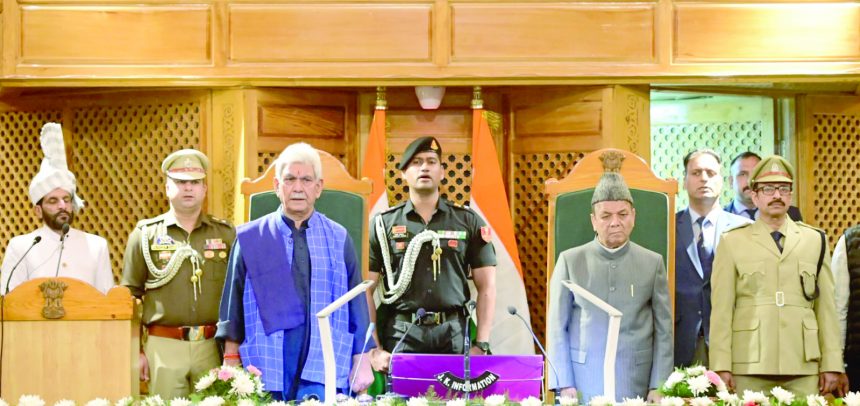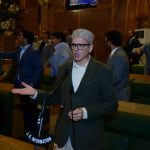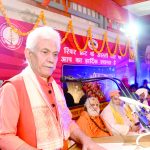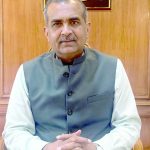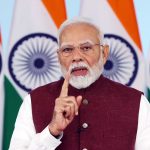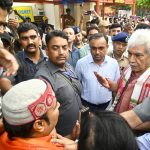Inaugurates first session of J&K Legislative Assembly focus on inclusive growth
Welfare initiatives to empower every citizen in J&K
Highlights hydro projects to double power generation by 2026
Announces 200 units of free power to deserving families
Srinagar, Nov 04: Lieutenant Governor Manoj Sinha inaugurated the first session of Jammu and Kashmir’s newly elected Legislative Assembly, extending a warm welcome to the members.
In his address, he commended the “successful and peaceful conduct of the first democratic elections in over a decade,” calling it a pivotal moment that marks the “restoration of democratic governance after a period of political uncertainty.”
This election, the first since the abrogation of Article 370 in 2019, represents a major step forward in solidifying democracy in the region.
Lieutenant Governor Manoj Sinha said that his government will make all the efforts to restore full statehood and constitutional guarantees to the State.
“My government will make all efforts for restoration of full statehood and constitutional guarantees available to the state. It would be a befitting reciprocation of the faith reposed by the people of Jammu and Kashmir in our democratic institutions,” he said in the ceremonial speech that puts forward the government’s agenda and is cleared by the cabinet.
The Lieutenant Governor reaffirmed the government’s dedication to pursuing full statehood, an aspiration mirrored in a recent resolution passed by the Council of Ministers and previously echoed in statements by the Prime Minister.
“The Council of Ministers of Jammu and Kashmir has recently passed a unanimous resolution calling for the immediate restoration of statehood. This resolution reflects the collective will of the elected representatives, echoing the aspirations of the people for the reinstatement of full democratic governance.
Reflecting on the high voter turnout, particularly in regions previously affected by separatist activities, the LG remarked that it underscored the people’s faith in democracy as a means of expressing their aspirations. “This accomplishment is a matter of great satisfaction,” he stated, attributing the success to the joint efforts of the administration, political leaders, and security forces.
Sinha affirmed that efforts are underway to facilitate the rehabilitation and return of Kashmiri Pandits. “The government is dedicated to creating safe and secure environments to enable their return,” he said, adding that transit accommodation projects are being accelerated to ensure comfortable and secure resettlement options for returning families.
Sinha emphasised the government’s commitment to inclusive growth, announcing welfare initiatives and measures aimed at making Jammu and Kashmir a place where “every individual has the opportunity to thrive” and “prosperity is shared.” He highlighted the upcoming implementation of several welfare programs under the leadership of Chief Minister Omar Abdullah, aimed at providing opportunities for all citizens and fostering social harmony.
Acknowledging Jammu and Kashmir’s abundant water resources, Sinha stressed their potential to boost the region’s financial health and address electricity demands. “The government is expediting work on four hydroelectric projects,” he said, with the goal of doubling power generation by 2026. Plans are underway to provide 200 units of free electricity to eligible households, while the PM-Surya Ghar Muft Bijli Yojna will deliver solar power to approximately 84,000 homes.
The LG also announced plans to implement the recommendations of the 2011 Rangarajan Committee Report, which outlines a roadmap for job creation and economic growth. He reiterated the commitment to fast-track filling of government vacancies and to expedite compassionate appointments.
The government is determined to provide safe drinking water to all. Sinha outlined that over 3,200 water supply schemes, costing more than Rs 13,000 crore, are currently under execution, aiming to provide functional tap connections to all rural households by March 2025. NABL-accredited labs will be set up to ensure quality control of drinking water.
To boost employment and industrial growth, the administration plans to develop 46 new industrial estates. These facilities will include modern infrastructure to attract investment and provide job opportunities, with subsidised industrial land allotted transparently. Additionally, the J&K Industrial Policy, 2021-30, is under review to align with the administration’s broader economic objectives. A new Central Sector package of Rs 28,400 crore is also set to encourage new investments.
In healthcare, the LG emphasized strengthening primary healthcare services, including preventive screening for non-communicable diseases and expanding dialysis facilities at the sub-divisional level. “Universal health coverage will be carried forward, along with the creation of a Chief Minister’s Medical Trust to assist those with terminal diseases like cancer and kidney failure,” he said.
The administration also remains committed to the welfare of marginalized communities, with extended reservation benefits and the operationalization of the Forest Rights Act, 2006. Initiatives for Scheduled Tribes include support in health, education, and livelihoods, alongside the activation of the Tribal Research Institute building and hostel in Srinagar.
Tourism remains a “major pillar” of Jammu and Kashmir’s economy, with projects such as the Tawi Barrage in Jammu and upcoming rail connectivity set to enhance tourism. Sinha stressed that these infrastructure projects, including the Jammu-Akhnoor-Rajouri-Poonch National Highway, will improve connectivity and boost economic development.
The Lieutenant Governor concluded by urging legislators to work together to achieve a “peaceful, prosperous, and inclusive society,” stressing that the collective efforts of elected representatives will be key to realising a self-reliant Jammu and Kashmir.


